Today in the field we have the entry-level portable power station, the EcoFlow RIVER Mini Portable Power Station. It is an affordable power station with a no-frills experience that delivers on expectations. The RIVER Mini is a fantastic step up if you are used to battery banks and finding yourself needing just a bit more juice for all your devices. We recently used the RIVER Mini in our Extreme Edge – Enabling Astrophotography With HCI article, powering both a small compute cluster and support hardware.
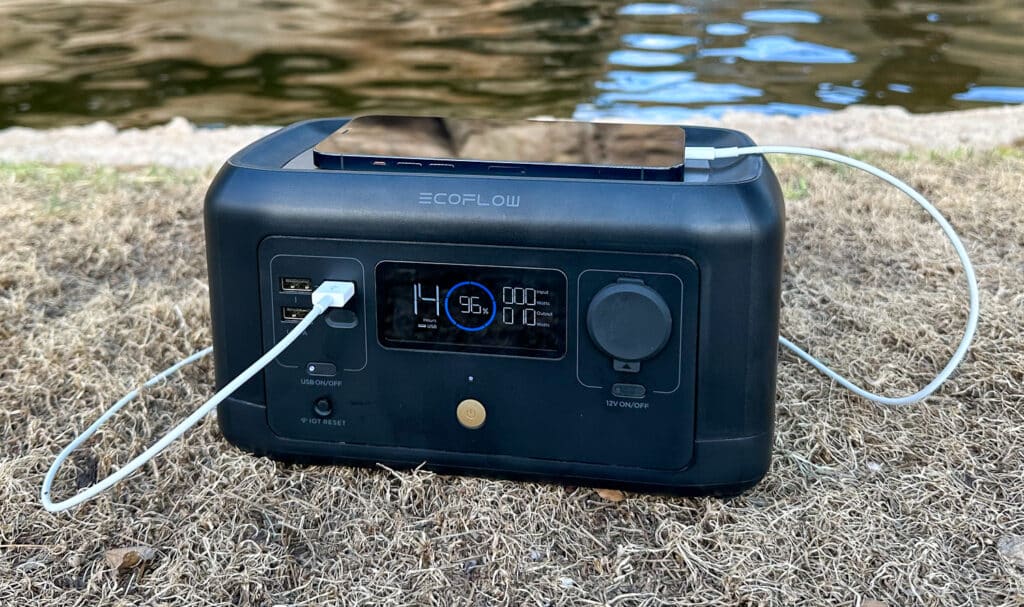
The RIVER Mini advertises 210 Wh of capacity, capable of delivering 300 watts of power, and capable of 600 watts surge using the X-Boost feature. In rudimentary testing, it delivered on these numbers when accounting for losses(80%-85% as we usually see in the industry).
The charging circuitry is integrated into the Ecoflow RIVER Mini so there is no need to lug around a power brick, just a standard PC-type power cord. Notably, the RIVER Mini has a surprisingly sparse number of outputs on the unit, two AC plugs, one 12v 10amp cigarette lighter style output, and three USB-A plugs for devices, capable of 2.4 amps.
If you want USB-C and Wireless Charging, you need to upgrade to the Wireless version. EcoFlow has two variations of the RIVER Mini; “Standard”(the one being reviewed here) and “Wireless.”
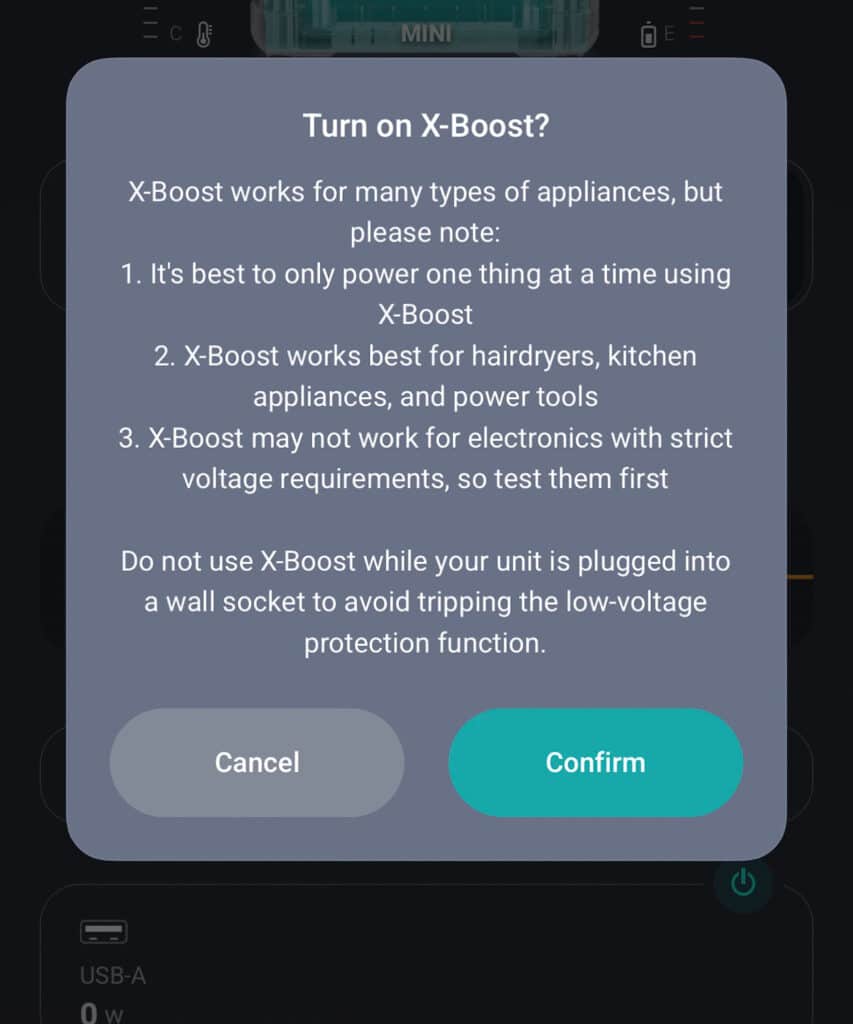
All of the outputs can be turned on or off independently, either by a button on the Ecoflow RIVER Mini, or from the app. Charging rates can also be set, and vital status monitored. One thing to note, the IoT feature on the RIVER Mini is either a WiFi Access Point or attached to a WiFi network. There is no Bluetooth support as far as I can ascertain and it is not mentioned on their site.
So if you do take this on the road, expect to have to do a reset, and join its access point, or have the RIVER Mini join your 5G or another hotspot to be able to get data. There was a strange iOS glitch encountered where the application warned of “Invalid Serial” until the phone realized that the network did not have internet access, meaning I was unable to complete the registration until the app phoned home. Something to consider if in a location without cellular service, and is possibly addressable via an update.
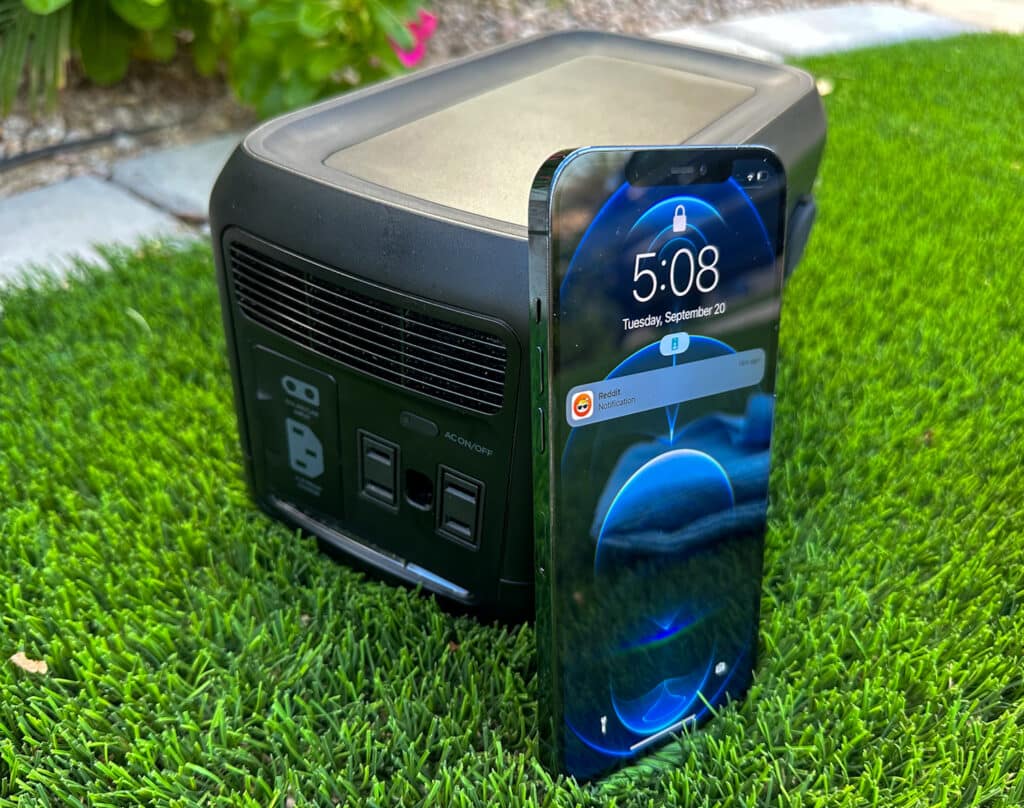
On a recent field test, I noticed and tested out the various charging capability from the car input. The car adapter was not included and was an additional purchase, but thanks to it being a standard port, it was easy enough to track down. Having the ability to change the DC charge rate means you get flexibility on how you end up charging, whether in a car or RV, or on a boat that may have a limited socket. The only complaint is that it would be preferential to be able to set these rates on the unit itself, and not rely on the app interface to do so.
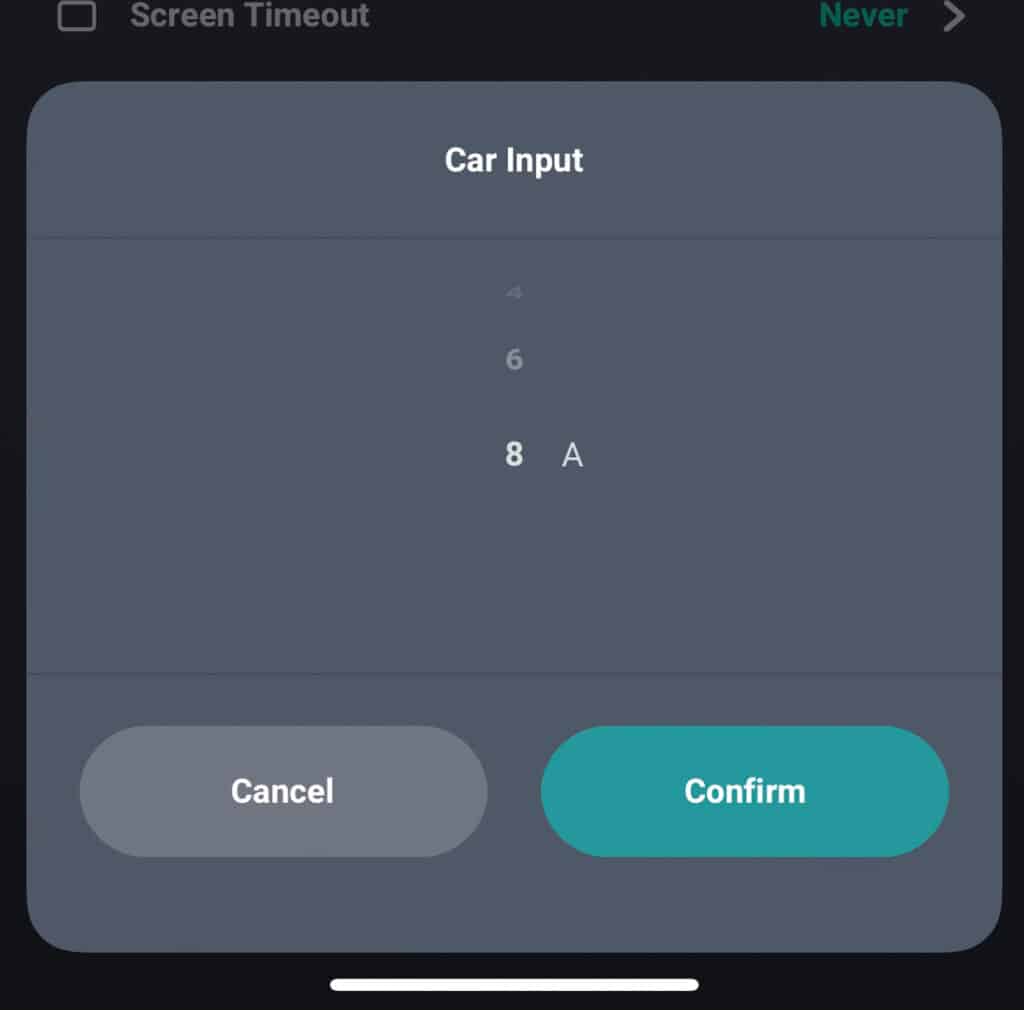
One thing that was surprising was the lack of an IP rating on the RIVER Mini, being that it is marked toward the outdoorsy adventure type, the manual specifically calls out to avoid water and rain at all costs.
I am happy to report, that after a surprise monsoon storm, the RIVER Mini took indirect splashes like a champ. The unit was tucked up under a cover for some larger gear, however, was too low to the ground to avoid the splash back. After promptly being brought inside, and then turned off to let it dry for two days, it powered on again with no discernible issues at all.
I want to make it clear, that this is not a recommendation at all, I got lucky.
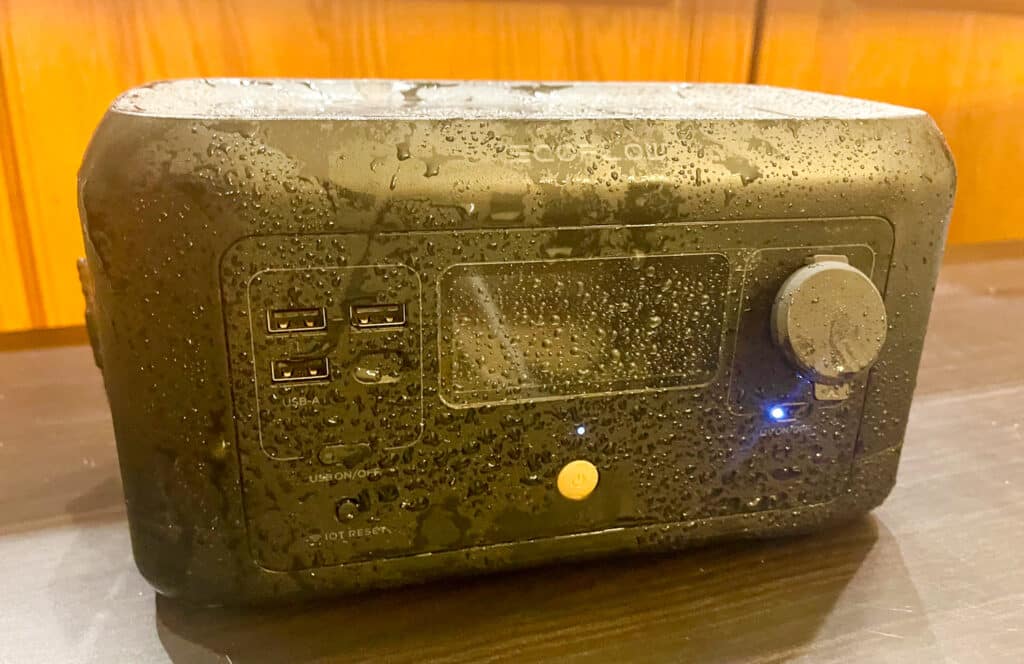
EcoFlow RIVER Mini Specs
| Wattage | 210 watt_hours |
| Item Weight | 6.3 Pounds |
| Input Voltage | 110 Volts |
| Output Wattage | 300 Watts, 600 Watts Surge |
| Product Dimensions | 9.8″L x 5.5″W x 5.2″H |
| Battery Type | Lithium |
| Model Name | 210Wh Backup Lithium Battery 300W Fast Charge |
| Item Weight | 6.3 pounds |
| Product Dimensions | 9.8 x 5.5 x 5.2 inches |
EcoFlow RIVER Mini – In the Field
The RIVER Mini is able to be recharged to 80% capacity in 1 hour from a standard wall outlet thanks to the fast charging, and also can be recharged by a vehicle 12v system (theoretically 24v if you have one of those), or a solar or other DC system up to 36v, meaning you have a lot of flexibility to store up some power for another time. The fast charging works as advertised, and has been so great to have, so much so that it is missed when using other power stations that do not have it.
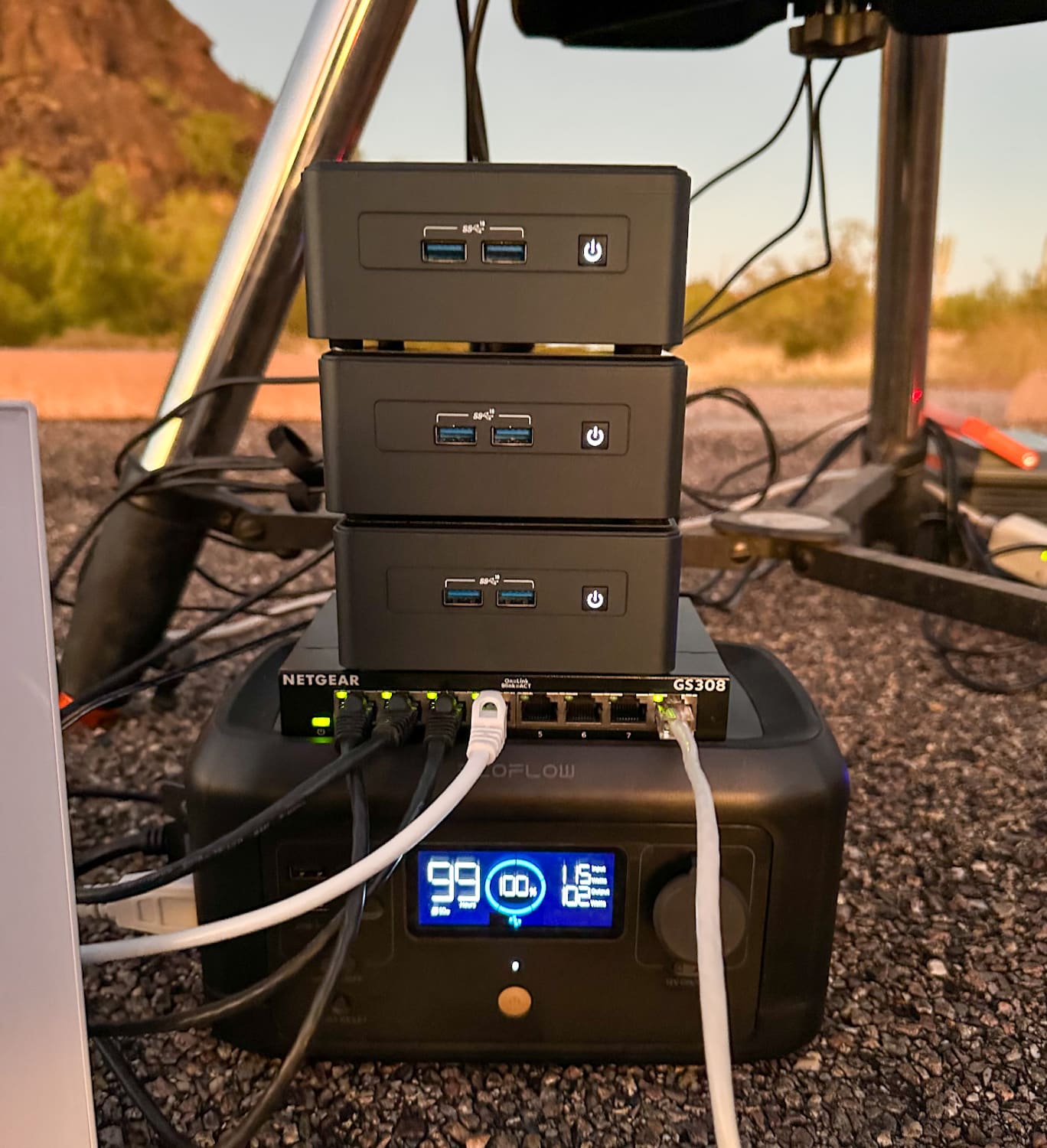
Field testing of the RIVER Mini with the Scale Computing 3 node HCI cluster, a Netgear 8 Port Router, and Starlink showed some promising results. This setup provided almost 2.5 hours of run time pulling around 100 watts sustained, which is on par with the expected capacity. The ambient temperature when the test started was around 95ºF and the RIVER Mini was able to keep providing power and accept a charge to top back up in the heat thanks to its own internal active cooling.
Final Thoughts
Overall the Ecoflow RIVER Mini is a solid product, and meets all of the expectations for an affordable entry-level power station, with the notable exception of the missing USB-C. Due to a couple of “user errors” we are also happy to report that the RIVER Mini has great build quality (taking a large tumble off the car and the surprise monsoon) and a respectable performance profile for its entry pricing.
This unit gets a solid recommendation and should fit in well for road trips or camping trips to top-off laptops, phones, or tablets, as long as you keep in mind the limitations of capacity and output. It would not fit in well for those looking to power larger appliances on a longer trip however unless you have the Car Charging cable, or a solar solution to top off when not in use. Overall though for a street price of ~$230, it’s a very handy portable power station.




 Amazon
Amazon